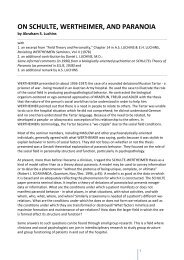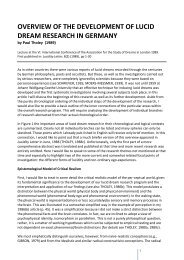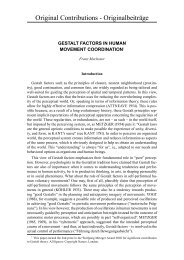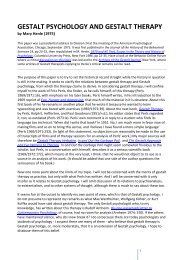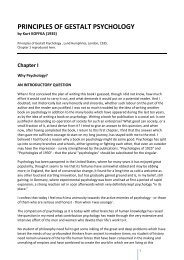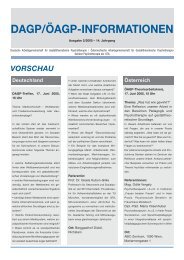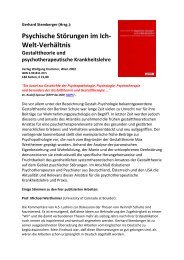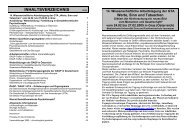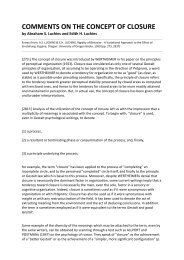pdf-Download - Society for Gestalt Theory and its Applications (GTA)
pdf-Download - Society for Gestalt Theory and its Applications (GTA)
pdf-Download - Society for Gestalt Theory and its Applications (GTA)
Create successful ePaper yourself
Turn your PDF publications into a flip-book with our unique Google optimized e-Paper software.
Curiously enough, <strong>Gestalt</strong> psychologists are a <strong>Gestalt</strong> in their own, since you will never be able to make a suredistinction between the ideas that are due to the one <strong>and</strong> the ideas that are due to the other: Everyone who isacquainted with the papers by WERTHEIMER, KÖHLER <strong>and</strong> KOFFKA knows very well that they constitute a uniquebook. In addition to, I noticed the same sort of unselfishness as to the ownership of research starting points that I cantestify in the case of KANIZSA. (p. 127)From his mentor, VICARIO wrote (p. 129), he learned the phenomenological attitude so welldescribed by Wolfgang METZGER (1963, p. 12): "to simply accept the facing thing as it is ... to letthe thing speak <strong>for</strong> <strong>its</strong> own, without indulging in what we know, or we previously learned, or inwhat is obvious, in the knowledge of the subject, in logical dem<strong>and</strong>s, in linguistic prejudices ..." <strong>and</strong>so on.... I always appreciated his theoretical minimalism, cause or effect of his exclusive attention <strong>for</strong> the data of immediateexperience ... I saw KANIZSA always attentive to single perceptual phenomena, <strong>and</strong> in some ways careless of theirtheoretical arrangement. He was a <strong>Gestalt</strong>ist, I think, because he was an experimental phenomenologist, but duringthe years I saw him ab<strong>and</strong>on the cumbersome physiological hypotheses of KÖHLER <strong>and</strong> KOFFKA, <strong>and</strong> retire to his ownview of pure phenomena bounded by phenomenal laws. (p. 130)METZGER dedicated his Gesetze des Sehens (1975; first edition, 1936) as follows: "Dem AndenkenMax WERTHEIMERs und den italienischen und japanischen Freuden, in denen sein Geist lebendiggeblieben ist." [In memory of Max WERTHEIMER <strong>and</strong> of Italian <strong>and</strong> Japanese friends, in whom hisspirit is still alive.] Recalling that WERTHEIMER studied with Christian von EHRENFELS in Praha[Prague], with Carl STUMPF in Berlin, <strong>and</strong> with Friedrich SCHUMANN in Frankfurt, VICARIOsurmised:That should mean that he was a follower of [Franz] BRENTANO's phenomenology ... According to [Georges] THINÈS(1977) the neurophysiological hypotheses (isomophism) with which WERTHEIMER <strong>and</strong> KÖHLER stuffed phenomenalevidence represent a backward step in the evolution of phenomenology ... Anyway, I think that, when speaking of the"spirit of WERTHEIMER", METZGER refers to the comm<strong>and</strong>ment that [Edmund] HUSSERL synthesized in the phrase:Zurück zu den Sachen selbst! [Back to the things themselves!] ... In short, phenomenology, <strong>and</strong> experimental, ifpossible. Exactly what KANIZSA did along his whole scientific life. (p. 130)WERTHEIMER had what might be called a phenomenon-centered experimental approach toresearch: letting the phenomenon "speak <strong>for</strong> <strong>its</strong>elf" <strong>and</strong> studying it under a variety of conditions[fn 4]. He issued an invitation <strong>for</strong> experimentation, not argumentation. [Years later KÖHLER issueda similar invitation in his Presidential address to the American Psychological Association (1959).]WERTHEIMER might have been influenced by HUSSERL's phenomenology. An essay on HUSSERL byJoseph LYONS (1968) stated:The most direct <strong>and</strong> specific of HUSSERL s effects on psychology as may be expected, occurred in Europe .... Of theimportant group who were at the University of Berlin just be<strong>for</strong>e World War I, <strong>and</strong> from whose joint ef<strong>for</strong>ts came theschool of gestalt psychology, Max WERTHEIMER <strong>and</strong> Karl DUNCKER were apparently deeply influenced byphenomenology. (p. 30)Similarly, an essay by Robert B. MACLEOD (1968) on phenomenology, referred to thephenomenological approach to perceptual organization represented by the Berlin group of gestaltpsychologists.The reality of gestalt qualities had been recognized by Christian von EHRENFELS in his article, "Über <strong>Gestalt</strong>qualitaten" (1890) <strong>and</strong> by [Karl] STUMPF, but it was Max WERTHEIMER's experimental studies of apparent movement (1912)which set the stage <strong>for</strong> the gestalt movement. The older theories could not admit as psychologically valid anexperience of movement when there is no physical movement in the stimuli; phenomenal movement had to beexplained away as an illusion. WERTHEIMER, like [David] KATZ, simply accepted the phenomenal fact as valid, insistingthat movement as such must have <strong>its</strong> direct neural correlate; hence the controversial principle of isomorphism ....While the gestalt theories which emerged, notably the physiological <strong>and</strong> the psychological field theories, go beyondphenomenology, the basic approach is in each case phenomenological. (p. 71)While not denying the basic importance of phenomenology, KÖHLER maintained that it wasnecessary to go beyond phenomenology <strong>and</strong> consider the brain field. "Beyond Phenomenology" is17



